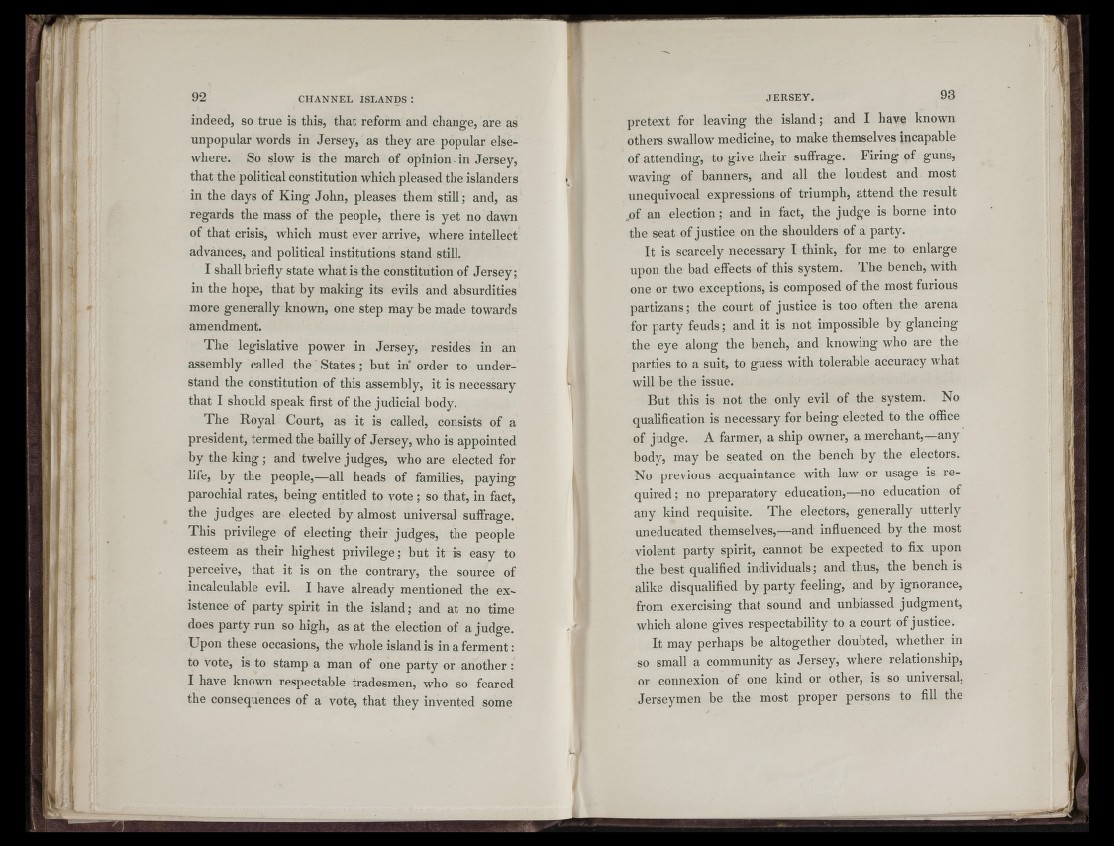
;;
. 1
)
92
indeed, so true is this, that reform and change, are as
unpopular words in Jersey, as they are popular elsewhere.
So slow is the march of opinion. in Jersey,
that the political constitution which pleased the islanders
in the days of King John, pleases them still; and, as
regards the mass of the people, there is yet no dawn
of that crisis, which must ever arrive, where intellect
advances, and political institutions stand still.
I shall briefly state what is the constitution of Jersey;
in the hope, that by making its evils and absurdities
more generally known, one step may be made towards
amendment.
The legislative power in Jersey, resides in an
assembly called the States; but in order to understand
the constitution of this assembly, it is necessary
that I should speak first of the judicial body.
The Royal Court, as it is called, consists of a
president, termed the bailly of Jersey, who is appointed
by the king ; and twelve judges, who are elected for
life, by the people,—all heads of families, paying
parochial rates, being entitled to vote; so that, in fact,
the judges are elected by almost universal suffrage.
This privilege of electing their judges, the people
esteem as their highest privilege; but it is easy to
perceive, that it is on the contrary, the source of
incalculable evil. I have already mentioned the existence
of party spirit in the island; and at no time
does party run so high, as at the election of a judge.
Upon these occasions, the whole island is in a ferment:
to vote, is to stamp a man of one party or another :
I have known respectable tradesmen, who so feared
the consequences of a vote, that they invented some
Í -
pretext for leaving the island; and I have knowm
others swallow medicine, to make themselves incapable
of attending, to give their suffrage. Firing of guns,
waving of banners, and all the loudest and most
unequivocal expressions of triumph, attend the result
of an election; and in fact, the judge is borne into
the seat of justice on the shoulders of a party.
It is scarcely necessary I think, for me to enlarge
upon the bad effects of this system. The bench, with
one or two exceptions, is composed of the most furious
partizans; the court of justice is too often the arena
for party feuds; and it is not impossible by glancing
the eye along the bench, and knowing who are the
parties to a suit, to guess with tolerable accuracy what
will be the issue.
But this is not the only evil of the system. No
qualification is necessary for being elected to the office
of judge. A farmer, a ship owner, a merchant,—any
body, may be seated on the bench by the electors.
No previous acquaintance with law or usage is required;
no preparatory education,—no education of
any kind requisite. The electors, generally utterly
uneducated themselves,—and influenced by the most
violent party spirit, cannot be expected to fix upon
the best qualified individuals; and thus, the bench is
alike disqualified by party feeling, and by ignorance,
from exercising that sound and unbiassed judgment,
which alone gives respectability to a court of justice.
It may perhaps be altogether doubted, whether in
so small a community as Jersey, where relationship,
or connexion of one kind or other, is so universal,
Jerseymen be the most proper persons to fill the